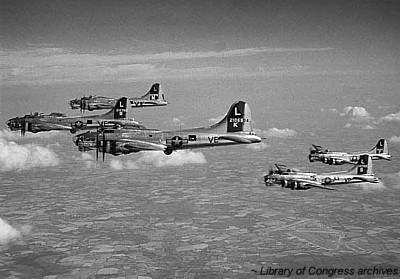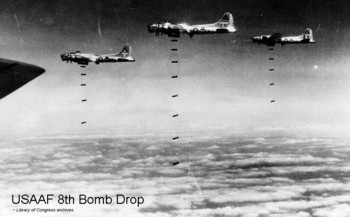


Cerro Gordo
County Iowa
Part of the
IaGenWeb Project
|
The
Globe Gazette 
But local veterans of the "Mighty Eighth" - the largest military unit in the war and the biggest bombing force of all time - weren't fully aware of the significance of what they were doing at the time. "I learned more about World War II by watching The History Channel than I knew then," said Carroll BOGARD of Mason City. More than 350,000 men and women served in the Eighth Air Force during World War II. About 26,000 were killed in action - one-tenth of all the Americans killed in the war - and more than 28,000 were taken prisoner. The number of those wounded or missing in action has not been counted. Oct. 8-14 was declared Mighty Eighth Air Force Week across the nation. It was during that week in 1943 that the unit lost more than 100 heavy bombers to enemy action over the skies of Europe. Despite the heavy losses, many historians feel this was the turning point for daytime strategic bombing. The Eighth Air Force, which was stationed in England, bombed German factories and bridges. The ground crews were responsible for getting the bombs on the planes before they took off in the morning. "Those guys hardly slept," BOGARD said. Art PETERSEN of Mason City, who was on a ground crew, said he would set the bombs on delayed action so they would get down into a factory before exploding rather than just landing on top of it. According to PETERSEN, the Germans never ran out of planes, but they did lose a lot of their experienced pilots. They also ran out of fuel toward the end of the war. PETERSEN'S unit participated in D-Day. Just before the landing at Normandy each sailor, soldier and airman who was to take part received a copy of a letter from General EISENHOWER. PETERSEN still has his letter, which mentions how the Allied air offensive reduced the Germans' strength. PETERSEN said the Air Force nearly put a stop to daytime flying because the losses were so great. He recalled how one plane from his unit got hit right where the navigator sat. When the plane came back, "There was no navigator, just a big hole," he said. Joe BARNES of Mason City was a navigator with his bomber crew, which flew 35 missions up and down the Rhine. "Our crew was pretty darn fortunate," he said. "None of us even got a scratch. We got the hell shot out of our aircraft, though." The Eighth Air Force dropped propaganda leaflets as well as bombs. PETERSEN still has copies of those leaflets, printed in German, Dutch, French and other languages spoken in occupied Europe. No Eighth Air Force mission was ever turned back due to enemy action, but the Germans did shoot down some of the American planes after they dropped their bombs. BOGARD was in one of those planes. "It was the easiest mission we had," BOGARD said. "We never saw nothing." Immediately after the B-24 bombed its target, one well-placed hit from a German fighter plane brought the craft down. "Some guy was a pretty good shot," BOGARD said. The Germans captured BOGARD after his plane went down. They forced him and other prisoners of war to march for 87 straight days. They slept in barns at night. As far as food, "the best thing we had was potatoes out of a manure pile," he said. "We would just rub them off a little and eat those suckers." Jim BROWN of Mason City was also in a bomber who was shot down. He landed in Holland and hid with first the Dutch and then the Belgian underground for more than a month before the German secret police caught him in Antwerp - just 10 days before the Allies recaptured the city. "Someone sold me out. I don't know who," BROWN said. Both BOGARD and BROWN spent some time in POW camps. Toward the end of the war the camps they were in were liberated. General PATTON'S Third Army freed the prisoners at the camp BROWN was in. "We got to see PATTON with his pearl-handled pistols," he said. PETERSEN, BOGARD and BARNES all visited Europe again years after the war ended. "The British people were very appreciative of the Eighth Air Force," BARNES said. "We saved their necks." Several of the Mason City veterans have attended Eighth Air Force reunions. BARNES said his crew used to have a reunion every year, but now only four members are still living. He still corresponds with the pilot, who lives in Texas, over the Internet once a month. Those who served in the Eighth Air Force during World War II are now considered heroes, but BARNES said his crew simply focused on getting the job done. "It was just like going to the office each day," he said. 


Additional information sources: |